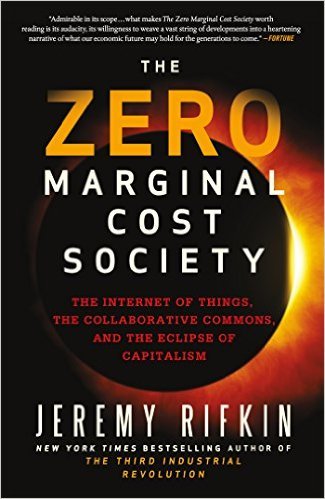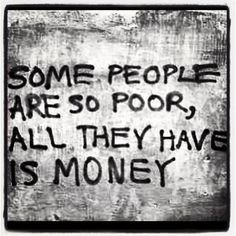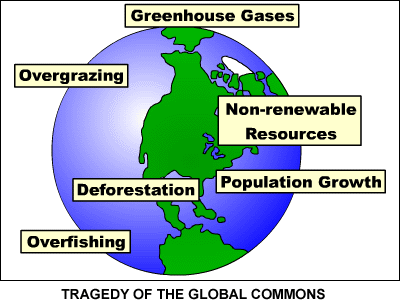(Steemit original content by Sean King, JD, CPA, MAcc)
If you've not read Jeremy Rifkin's wonderful book The Zero Marginal Cost Society: The Internet of Things, the Collaborative Commons and the Eclipse of Capitalism, you should. In hopes of explaining why, I'll summarize it here. And I'll explain why the rise of blockchain technology in general, and Steem in particular, was an important prerequisite to the fulfillment of Jeremy's radical expectations. All quotes below are from the book.

The Decline of Capitalism
The book contends that capitalism will no longer be the world’s primary economic paradigm by the second half of this century. Yet, oddly, he explains that capitalism won't be undermined by a catastrophic failure but rather by its astounding success. As Jeremy notes in the book, there’s an inherent contradiction within the heart of capitalism: The more successful it becomes, the more impossible it is for the system to continue.
Capitalism is unquestionably the engine of innovation, especially technological innovation. However, technological innovation leads to increasing output at a lower and lower marginal cost. As more and more things become digitized or virtualized--books, movies, music, virtual reality based travel, a college education, etc.--we can produce nearly unlimited supplies at near zero additional cost.
While this sounds like a good thing (and it is!), it's a death sentence for capitalism. Zero marginal cost goods and services mean, essentially, no profits for capitalists. Why? Read the book for the complete explanation. Just note for now that, without profits, capitalists have no motive to risk their wealth, innovate and produce. Consequently, capitalism (in its strict economic definition, at least) slowly dies:
"As more and more of the goods and services that make up the economic life of society edge toward near zero marginal cost and become almost free, the capitalist market will continue to shrink into more narrow niches where profit-making enterprises survive only at the edges of the economy, relying on a diminishing consumer base for very specialized products and services."
The Rise of the Collaborative Commons
What replaces capitalism then? This is where Jeremy introduces his idea of the "Collaborative Commons":
"We are so used to thinking of the capitalist market and [socialist] government[s] as the only two means of organizing economic life that we overlook the other organizing model in our midst that we depend on daily to deliver a range of goods and services that neither market nor government provides. The Commons predates both the capitalist market and representative government and is the oldest form of institutionalized, self-managed activity in the world.
The contemporary Commons is where billions of people engage in the deeply social aspects of life. It is made up of literally millions of self-managed, mostly democratically run organizations, including charities, religious bodies, arts and cultural groups, educational foundations, amateur sports clubs, producer and consumer cooperatives, credit unions, health-care organizations, advocacy groups, condominium associations, and a near endless list of other formal and informal institutions that generate the social capital of society."
These non-profit, non-governmental organizations are motivated by mission and cooperation rather than by money. While they are often overlooked by economists for this reason, they are actually incredibly significant. According to Jeremy, the contemporary Commons already accounts for over $2 trillion per year in economic output. But, more importantly, the Commons is the social fabric that holds our society together:
"[W]ere we to wake up one day to find that all of our civil society organizations had vanished overnight, society would quickly wither and die. Without places of worship, schools, hospitals, community support groups, advocacy organizations, sports and recreation facilities, and arts and other cultural institutions, we would lose our sense of purpose and identity and the social ties that unite us as an extended human family.
While the capitalist market is based on self-interest and driven by material gain, the social Commons is motivated by collaborative interests and driven by a deep desire to connect with others and share. If the former promotes property rights, caveat emptor, and the search for autonomy, the latter advances open-source innovation, transparency, and the search for community.
What makes the Commons more relevant today than at any other time in its long history is that we are now erecting a high-tech global technology platform whose defining characteristics potentially optimize the very values and operational principles that animate this age-old institution."
The Significance of Blockchains
Although this book was written at the very dawn of blockchain technology, and Jeremy therefore mentions it only in passing much later in the book, it's increasingly clear to this reader that blockchains like Steem will be the core component of that "high-tech global technology platform whose defining characteristics...optimize the very values and operational principles" of the Commons. It's blockchains that will undermine the foundations of capitalism, making everyone "prosumers"--producers of the very things they consume.

"Capitalism is a unique and peculiar form of enterprise in which the workforce is stripped of its ownership of the tools it uses to create the products, and the investors who own the enterprises are stripped of their power to control and manage their businesses."
The prosumer-based Collaborative Commons, powered by user-owned blockchains, rectifies this anachronistic peculiarity of capitalism. In a world of decentralized prosumers making and creating products and services for themselves and others at little to no marginal cost, profit becomes mostly irrelevant to abundance:
"Hundreds of millions of people are already transferring bits and pieces of their economic life from capitalist markets to the global Collaborative Commons. Prosumers are not only producing and sharing their own information, entertainment, green energy, 3D-printed goods, and massive open online courses on the Collaborative Commons at near zero marginal cost. They are also sharing cars, homes, and even clothes with one another via social media sites, rentals, redistribution clubs, and cooperatives, at low or near zero marginal cost. An increasing number of people are collaborating in “patient-driven” health-care networks to improve diagnoses and find new treatments and cures for diseases, again at near zero marginal cost. And young social entrepreneurs are establishing ecologically sensitive businesses, crowdfunding new enterprises, and even creating alternative social currencies in the new economy. The result is that “exchange value” in the marketplace is increasingly being replaced by “shareable value” on the Collaborative Commons. When prosumers share their goods and services on a Collaborative Commons, the rule book that governs a market-exchange economy becomes far less relevant to the life of society."
Objections of Mainstream Economists
Economists steeped in traditional economic models can't get their minds around the Collaborative Commons paradigm even while watching it unfold before their very eyes. Consequently, they continue to raise a number of now-discredited objections.
The first is that nothing will be produced absent a profit motive. However, we know this to be untrue already, and it will be increasingly untrue in the future. Already the Commons is huge, and millions of prosumers increasingly collaborate to create astoundingly beneficial things. We see this especially with open source software projects, but it's also common in social media, educational ventures, public domain patents, charitable institutions, Collective Commons licenses, and much, much more.

Quite simply, people are motivated by far more than money. Fame, popularity, notoriety, political agendas, altruism, honor, truth, sex, social causes and many, many more human interests and pursuits motivate people to create and share as much as, or more than, profit does. Whereas before it was usually necessary to access hoards of capital to pursue these ends with gusto and a reasonable expectation of success, that's not true in the zero marginal cost society. Under capitalism, profits were always a means to various ends rather than an end in itself. In the future, when one can pursue the ends directly and at virtually no marginal cost, the profit motives dies for lack of relevance.
A second objection often offered by traditional economists is sometimes known as the "Tragedy of the Commons"--the idea that any free good or service will be abused into oblivion by "free riders" seeking to gain something while contributing nothing. Consequently, nothing worth protecting should be ever be free.

This contention is based upon the fallacy that market forces are the only way, or at least the best, way to prevent such over use. However, even before markets evolved, evolution developed other means of regulating and limiting potential abusers--social protocols, shunning, shaming, etiquette, peer pressure, customs, taboos and the like have proven highly effective at regulating human conduct outside of governments and markets, and even within them. As Jeremy notes, every effective Commons ultimately develops "self-regulating, self-enforcing protocols and accompanying punishments agreed to by its members as a condition of participation."
Jeremy, summarizing Ostrom, explains the essential elements of an effective, abuse-resistant Commons:
"After years of field investigations and research on what makes commons work, Ostrom and her colleagues came up with seven “design principles” that seem to be integral to every effective commons surveyed.
First, effective management of a commons requires “clearly defined boundaries” on who is allowed to appropriate from the commons and who is not.
Second, it’s necessary to establish appropriation rules restricting the time, place, technologies, and quantity of the resources that can be used as well as setting up the rules on the amount of labor, materials, and money that can be allotted to the appropriation.
Third, a commons association needs to guarantee that those affected by the appropriation rules jointly and democratically determine those rules and their modifications over time.
Fourth, the commons association should ensure that those monitoring the activity on the commons are the appropriators or are accountable to them.
Fifth, appropriators who violate the rules should, in principle, be subject to graduated sanctions by the other appropriators or officials accountable to the appropriators, to guard against overly punitive punishment that sours their future participation and creates ill will in the community.
Sixth, the commons association ought to build in procedures for rapid access to low-cost private mediation to quickly resolve conflict among appropriators or between appropriators and public officials.
Seventh, it is vital that government jurisdictions recognize and condone the legitimacy of the rules established by the commons association. If government authorities do not provide a minimum recognition of the authority of the commons association to self-manage and, in effect, treat it as illegitimate, the self-rule of the commons is not likely to be able to sustain itself over time.
Anyone familiar with cryptocurrency or blockchains will instantly recognize the significance of the above seven "design principles". They nearly perfectly describe the creation and operation of...blockchains! However being purely voluntary, self-enforcing systems, blockchains are largely beyond the reach of coercive governments and the seventh design principle noted above is therefore perhaps irrelevant.
Blockchains are, quite simply, the empowering technology of the governance system of the Collaborative Commons. Even if markets and governments had once been necessary to prevent a Tragedy of the Commons, that's no longer true in a world with blockchains. Blockchains solve the Tragedy of the Commons conclusively, and without coercion, opening society for the first time to the possibility a voluntary, widespread Collaborative Commons.
Steem is the Gateway to the Blockchains
The old capitalist and socialist paradigms are so engrained in the public's psyche that only a very few--great establishment thinkers like Jeremy and "radical" libertarians and anarchists--can conceive of alternatives like the Collaborative Commons. Blockchain enthusiasts have known for several years now that other possibilities exist, but the public at large couldn't grasp them. The whole idea of the Commons, bitcoin and blockchains was just too foreign.
This is why Steem is so important. Steem is the solution to mass public awareness and appreciation of power and importance of blockchains. Thanks to Steemit, it's no longer necessary for the public to "understand" blockchains, they need only experience them instead. And experience is worth ten million words.
As more and more members of the public see first-hand via Steemit the power, usefulness and economic advantages of a blockchain-regulated Collaborative Commons, they will begin to ask a simple but profoundly disruptive question: Why doesn't everything work like this?
And then it will dawn on them: There's no reason. No reason at all.
At that point the old centralized, competitive world dies and a new decentralized, collaborative one is reborn from its ashes. The post-capitalist era of the blockchain-enabled Collaborative Commons is at hand.
Great post.
This is what is necessary for mass adoption. Non crypto people don't understand these crypto concepts very well. Explaining one to someone who has no clue about the existence of crypto currencies and social network based on crypto is an uphill task. I'm not anti-capitalist but i'd love to see a change! :)
Downvoting a post can decrease pending rewards and make it less visible. Common reasons:
Submit
Liked the concept Prosumer. It is really difficult to visualize the concept of producing many useful things with no marginal cost. Maybe because I have an old school way of looking at this.
I do agree that there are many other motivational factors for humans which can be influenced to produce something. In Maslow's hierarchy of needs the top level which represents "self-actualization" is a powerful motivation. The urge to be a part of something big and be at the giving end can be something which revolutionizes the way we make things.
I hope this blockchain revolution does great things for humanity and I am happy to be a tiny part of it.
Downvoting a post can decrease pending rewards and make it less visible. Common reasons:
Submit
Thanks, @dev. I agree, the zero marginal cost thing is hard to grasp. It's not that things actually get to zero, it's just that they approach zero. Music is a pretty good example. An artist can make a million or a billion digital copies of an album for about the same cost as making 10 or 100. Yes, there are some fixed cost up front, but once those are covered, the cost of making more approaches zero in the digital realm.
Downvoting a post can decrease pending rewards and make it less visible. Common reasons:
Submit
I understand. I don't see it for many consumer products clearly. But, I do believe with automation, cost of producing one additional unit will come close to zero. I understand the economic view.
While reading the article I was visualizing car manufacturing. I was able to see raw materials, machines, etc as cost. That is why I mentioned I was finding it difficult. But, the article above makes a great attempt to establish the new concepts as well as convince the reader. Thanks a lot for the interaction. See you around.
Downvoting a post can decrease pending rewards and make it less visible. Common reasons:
Submit
Yah, I suppose it will be a while before large things like cars approach zero marginal cost. But thanks to 3D printing, nanotech, etc., many small things will. When I need new shoe laces in the future, I'll be able to hit "print" and create some almost for free. Eventually we'll have 3D printed cars and homes, thought that's admitedly decades away.
Downvoting a post can decrease pending rewards and make it less visible. Common reasons:
Submit
It's almost like you are welcoming me to the future. Wow, future looks like the world with endless possibilities. Now I can see your point better. Thanks for taking time to share your vision.
Downvoting a post can decrease pending rewards and make it less visible. Common reasons:
Submit
Wouldn't the greater production mean a higher capacity to create new products? Color me sceptical, but I don't see how the profit motive will be eliminated by increased innovation when all thoughout history, innovation and even automation have increased along side greater capital markets and instruments for running them.
In other words, I think capitalism will shift into new realms of production rather than be pushed to the margins. I could agree with the premise of the book if human needs were finite and materials were infinite, but the exact opposite is true.
Once we invent new forms of production it may cause temporary disruption of the old means, but we have always invented new ones to strive for. I don't see this trend changing.
Downvoting a post can decrease pending rewards and make it less visible. Common reasons:
Submit
The phrase "death of capitalism" is a sure fire way to get my upvote. :)
Downvoting a post can decrease pending rewards and make it less visible. Common reasons:
Submit